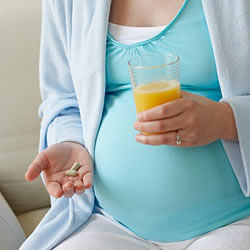Nutrition And Supplementation In Pregnancy
If you are living where you will be raising your own food organically on richly composted soil, have a goat, some chickens and a salmon stream, grind your own grain and bake your own bread, then you probably will not need any additional vitamin or mineral supplements. However, if you live in the suburbs or city and buy most of your food at a supermarket, prenatal supplements are not only recommended, they are necessary! Supplements will furnish any essential nutrients not obtained in adequate amounts of good wholesome foods.
These are the basic daily dietary needs during pregnancy. The nutrients recommended for lactating women are fairly comparable to those of pregnancy.
recommended for lactating women are fairly comparable to those of pregnancy.
- Calories – 2,400 – 2,600 per day
- Protein – 75 – 100gms daily. High quality protein is important since it is the one of most essential ingredients needed for optimum growth and development of the fetus. It is also thought to help prevent toxemia. Diet for a Small Planet, by Frances Moore Lappe’, is one suggested reading for complementary protein combinations for vegetarians.
- Calcium and Phosphorus – 1-2 gms daily. These are the most abundant minerals in the body. They are important in the formation of strong bones and teeth, blood clotting and strengthening nerves and muscles. Calcium absorption is enhanced when these two minerals are supplied in approximately equal amounts. Ample vitamin D assists absorption. Calcium lactate or carbonate are more easily assimilated. Increasing a calcium supplement and/or taking Vitamin E sometimes helps prevent leg cramps.
- Magnesium – 600-800 mg daily. This is required for protein synthesis, the contraction of muscles, and the conduction of nerve impulses.
- Iodine – 3-4mg daily. Using iodized salt will offer most women adequate iodine.
- Zinc – 10-15 mg daily. This is essential for the growth and repair of tissue.
- Iron – 30-60 mg daily. Iron and protein join to form hemoglobin, which carries oxygen throughout the body. It prevents common anemia and is assimilated better when taken with Vitamin C.
- The B-complex vitamins are essential in the utilization of food for energy. These vitamins are not stored in the body and should be eaten daily throughout pregnancy. Brewers yeast is a concentrated source of these vitamins.
- Folic Acid – (Bc) – At least 1 mg per day. It helps prevent certain forms of birth defects, anemia and is essential for the formation of both DNA and RNA.
- B12 – (cobalmin) 15-25 mcg daily. This reacts with folic acid to create red blood cells and prevent certain forms of anemia. It can be lacking if a person has been a complete vegetarian for several years, since it is found only in meat or dairy products.
- B6 – (pyridoxine) 20-50 mg daily. Important for healthy teeth and gums, red bloods cells and nervous system. For nausea, one may increase to 100 mg. per day.
- B1 – (thiamin) 5 mg per day. Necessary for proper functioning of heart and nervous system.
- B2 – (riboflavin) 5-10mg daily. Necessary for healthy skin and essential for building and maintaining body tissue.
- Niacin (B3) 50 mg. Aids the nervous system.
- Pantothenic Acid (B5) 50-100 mg. This is needed to properly metabolize carbohydrates, fats and protein.
- Paba – 30-50mg daily.
- Biotin (H) 15-25 mcg daily. Assists in metabolizing carbohydrates, proteins and fats.
- Inositol and Choline – 1,000 mg daily.
- Vitamin C – 500-1,000 mgs daily. Maintains elasticity of healthy tissues and helps form healthy skin, teeth, bones and blood vessels. Supports the immune system.
- Vitamin A – 10,000 – 25,000 units daily. Helps your baby develop strong and healthy bones, eyes, skin, hair, teeth, gums and glands.
- Vitamin D – 400 units daily. Essential for absorption of calcium and phosphorus. 15-20 minutes of sunlight is adequate to produce enough vitamin D.
- Vitamin E – 300-600 units daily. Helps maintain a higher oxygen content in the blood and is an excellent anti-oxidant. Some sources state that E helps prevent varicose veins, or is good for preventing stretch marks. It should not be taken within 8 hours of iron, since iron destroys vitamin E.
- Fluids – (10-12 glasses) Necessary for digestion, fluid balance, and metabolism. Fluids are involved in circulation, assimilation of nutrients and elimination. Inadequate fluids can cause preterm labor.
- Salt – The body requires more salt in order to remain healthy during pregnancy. Salt your food to taste. In normal pregnancy, the blood volume expands by more than 40% by the second trimester. Salt is a necessary nutrient for increasing the blood volume. It is not usually related to the normal minor swelling towards the end of pregnancy.
Supplements
There are many types and brands of supplements out there and it’s often hard to know what you should take. Basically, stay away from the synthetic supplements as most of them just pass through your body and don’t do much good. Look for “food based”, all natural supplements. It’s good to get supplements from a company that does testing to prove that the nutrients in their supplements are bio-available to the cells. The company I am very familiar with and trust is the Shaklee Corporation. Shaklee is a 54 year old company and a world leader in “natural supplements”. I’ve seen great results from their supplements with my clients through the years, I know this is a quality brand and will be happy to share more with you about them if you are interested. I’d be happy to order supplements for my clients at the member cost from Shaklee if you chose to use their supplements.
Shaklee also has wonderful, all natural baby care products and organic, safe household cleaners and laundry products at a much better price than you’ll find other places . . . so investigate!!
Pregnancy Tea
Buy equal parts by weight of each of the following dry herbs. Mix together and store in an airtight container.
- Red Raspberry
- Nettle
- Alfalfa
- Hibiscus
- Rose Hips
- Red Clover
To use, mix 1/3 to 1/2 cup of herb mix into 2 quarts of boiling water (turned off) and steep for 30 min or so. Strain into a sealable pitcher and add a sweetener if desired (honey, sugar, or Stevia). Refrigerate. This tastes wonderful hot or cold. Drink freely, up to a quart of tea per day.
Some Good Food Sources High in Vitamins and Minerals
- Black Strap Molasses
- Wheat Germ
- Kelp
- Nutritional Yeast
- Carob
- Dried Fruit
- Dark green leafy vegetables
- Dark orange or red vegetables or fruits
- Iron Cookware (iron is absorbed through food cooked in it)
- Shaklee brand IRON plus C Supplement
(will increase your Iron count without causing constipation)
Red Raspberry
 Brewed as a tea, Rubus species are the best known, most widely used and safest of all uterine, pregnancy tonic herbs. They contains fragrene, an alkaloid which gives tone to the muscles of the pelvic region; including the uterus itself. Most of the benefits ascribed to regular use of raspberry leaf tea throughout pregnancy can be traced to the strengthening power of fragrene or to the nourishing power of the vitamins and minerals found in this plant. Of special note are rich concentrations of vitamin C, the presence of vitamin E, and easily assimilated calcium and iron. Raspberry leaves also contains vitamins A and B complex and many minerals, including phosphorus and potassium
Brewed as a tea, Rubus species are the best known, most widely used and safest of all uterine, pregnancy tonic herbs. They contains fragrene, an alkaloid which gives tone to the muscles of the pelvic region; including the uterus itself. Most of the benefits ascribed to regular use of raspberry leaf tea throughout pregnancy can be traced to the strengthening power of fragrene or to the nourishing power of the vitamins and minerals found in this plant. Of special note are rich concentrations of vitamin C, the presence of vitamin E, and easily assimilated calcium and iron. Raspberry leaves also contains vitamins A and B complex and many minerals, including phosphorus and potassium
The benefits of drinking a raspberry leaf brew before and throughout pregnancy may include:
- Increasing fertility in both men and women. Red raspberry leaf is an excellent fertility herb when combined with Red Clover.
- Preventing miscarriage and hemorrhage. Raspberry leaf tones the uterus and helps prevent miscarriage and post partum hemorrhage from a relaxed or atonic uterus.
- Easing morning sickness. Many women attest to Raspberry leaves gentle relief of nausea and stomach distress throughout pregnancy.
- Reducing pain during labor and after birth. By toning the muscles used during labor and delivery Raspberry leaf eliminates many of the reasons for a painful delivery and prolonged recovery. It does not, however, counter the pain of cervical dilation.
- Providing a safe and speedy parturition. Raspberry Leaf works to encourage the uterus to let go and function without tension. It does not strengthen contractions but does allow the contracting uterus to work more effectively and so may make the birth easier and faster.
- Helping to bring down an undelivered placenta. Raspberry Leaf by itself is not effective for this problem. Combined with Ground Ivy or Angelica it does facilitate the birth of the placenta, but either of those herbs alone would do.
- Assisting in production of plentiful breast milk. The high mineral content of Raspberry Leaf assists in milk production, but its astringency may counter that for some women. Mixtures of red raspberry with fenugreek and mother’s thistle are effective to increase milk supply.
Information on Red Raspberry leaf benefits and usage taken from Susun S. Weed’s Wise Woman – Herbal for the Childbearing Year, Ash Tree Publishing, N.Y., 1986.
Please also visit my Health and
Nutrition website at:
www.shaklee.net/barbie
